外研版九年级下册 Module 2 Education Unit 1 They don't sit in rows 课件(共23张PPT)+内嵌音频
文档属性
| 名称 | 外研版九年级下册 Module 2 Education Unit 1 They don't sit in rows 课件(共23张PPT)+内嵌音频 |
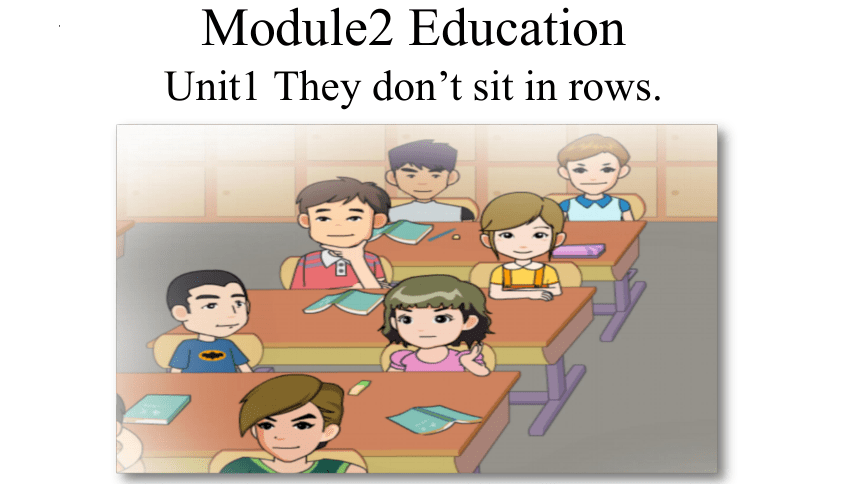
|
|
| 格式 | pptx | ||
| 文件大小 | 6.2MB | ||
| 资源类型 | 教案 | ||
| 版本资源 | 外研版 | ||
| 科目 | 英语 | ||
| 更新时间 | 2024-08-20 06:57:52 | ||
图片预览

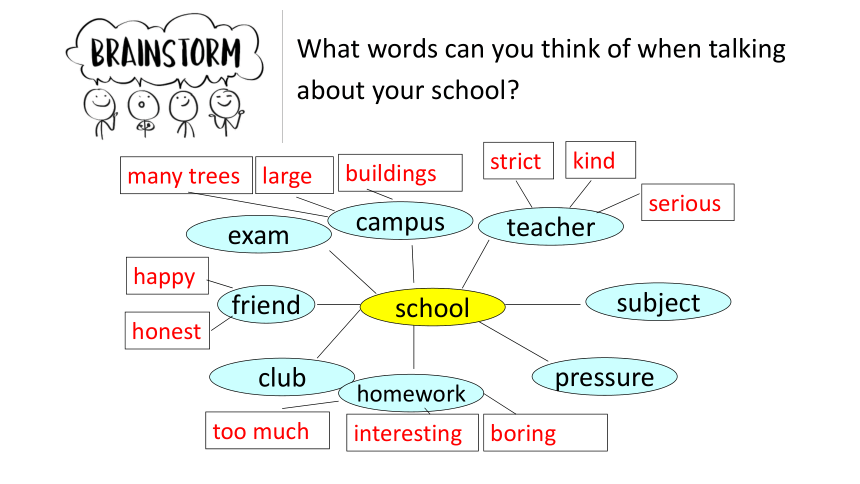
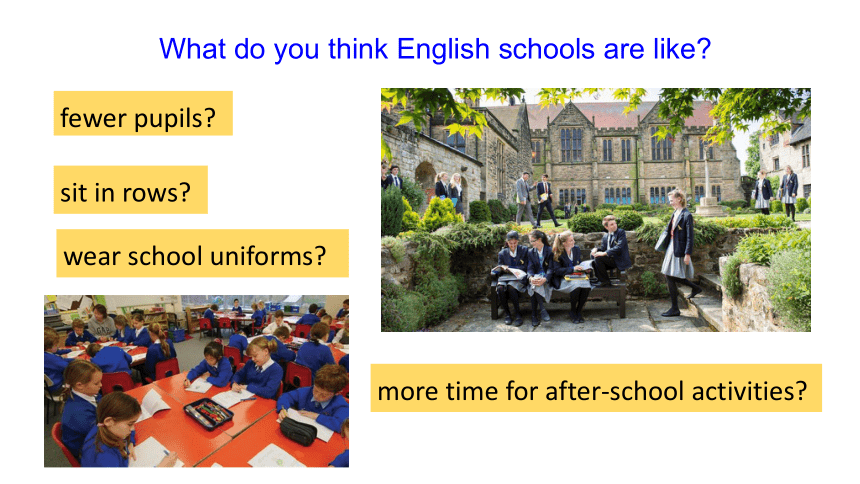
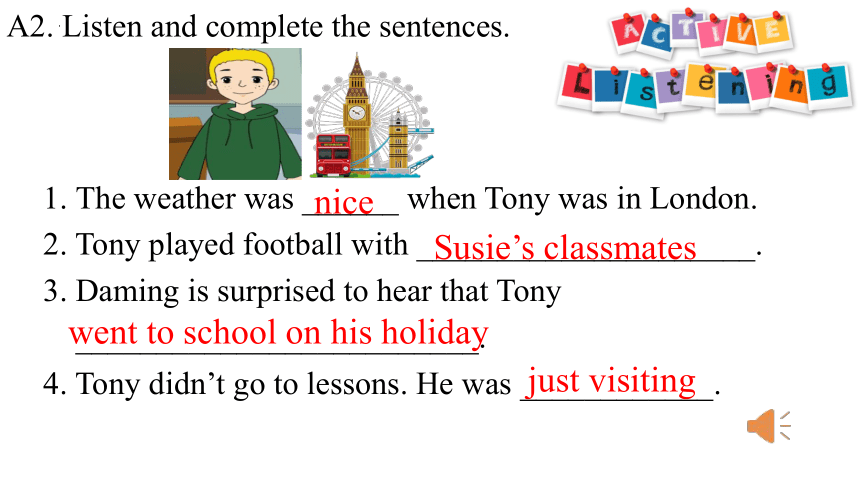
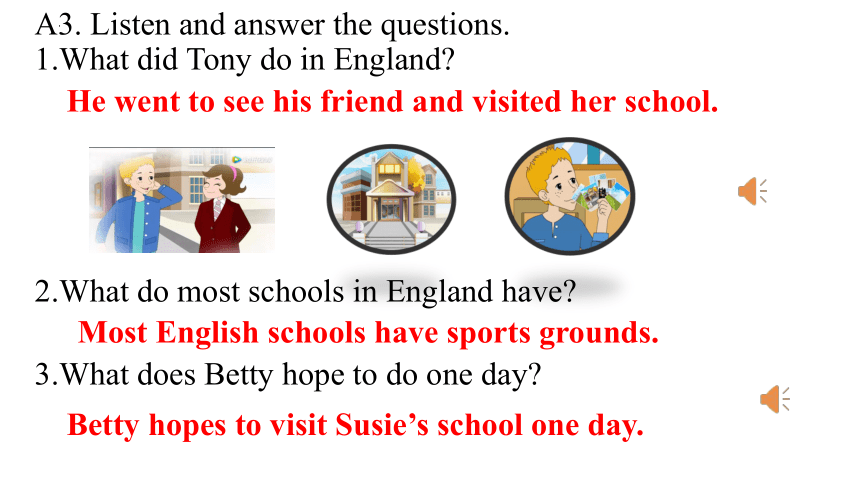
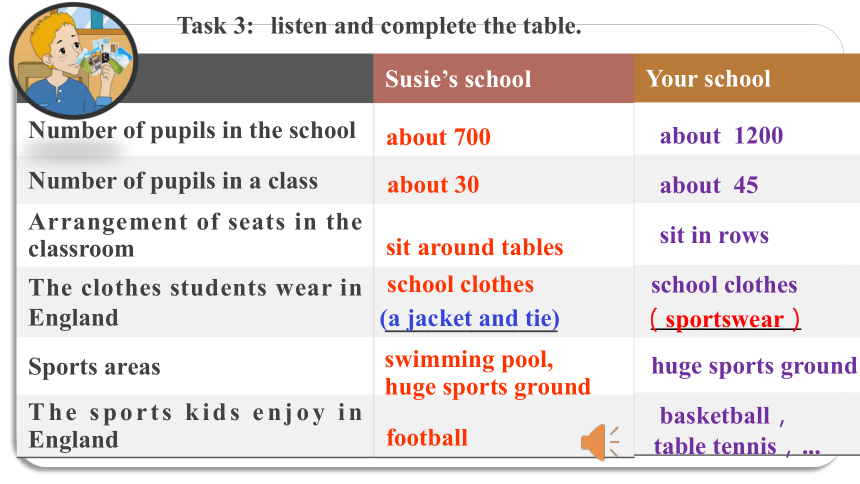
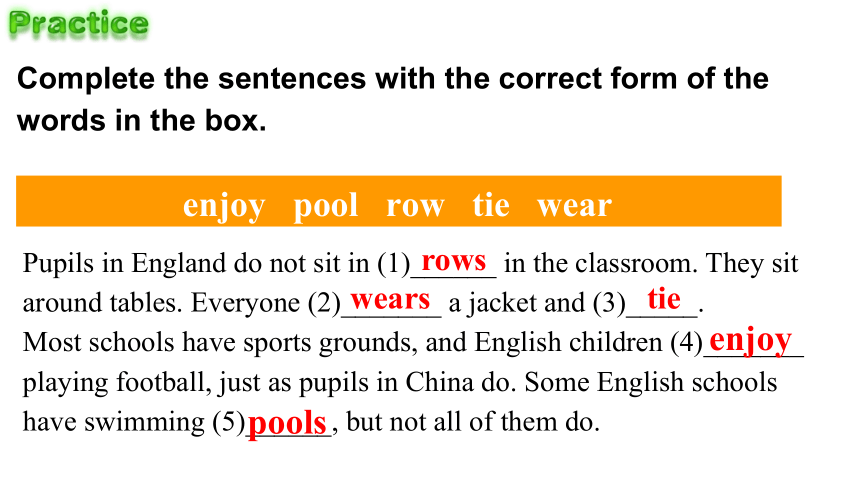
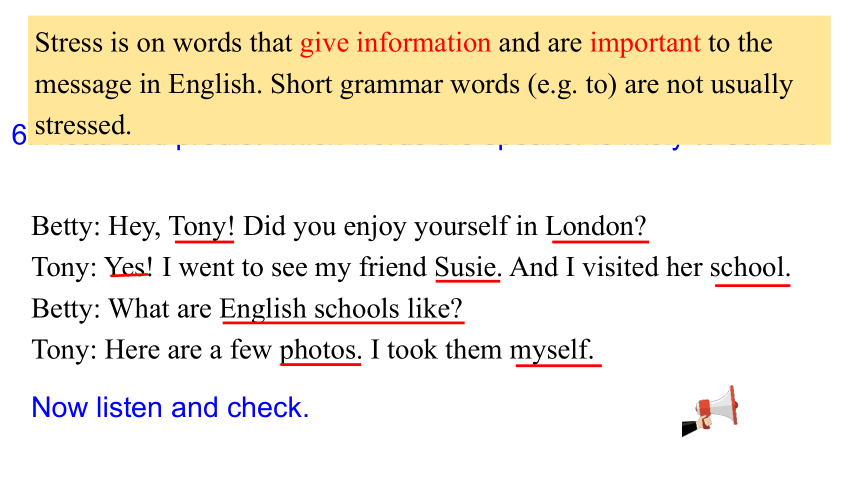
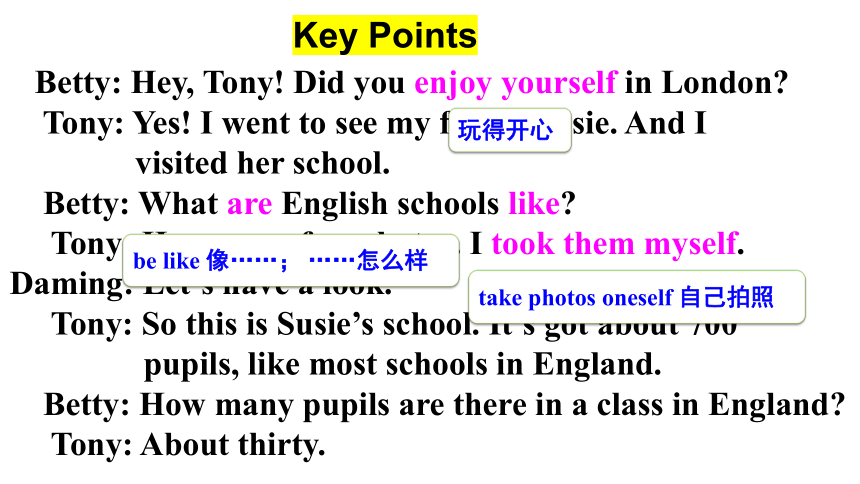
文档简介
(共23张PPT)
Module2 Education
Unit1 They don’t sit in rows.
What words can you think of when talking about your school
club
campus
teacher
subject
pressure
homework
school
friend
exam
strict
kind
serious
too much
interesting
boring
large
buildings
many trees
happy
honest
What do you think English schools are like
wear school uniforms
sit in rows
fewer pupils
more time for after-school activities
1. The weather was ______ when Tony was in London.
2. Tony played football with _____________________.
3. Daming is surprised to hear that Tony
_________________________.
4. Tony didn’t go to lessons. He was ____________.
A2. Listen and complete the sentences.
nice
went to school on his holiday
just visiting
Susie’s classmates
A3. Listen and answer the questions.
1.What did Tony do in England
2.What do most schools in England have
3.What does Betty hope to do one day
Betty hopes to visit Susie’s school one day.
Most English schools have sports grounds.
He went to see his friend and visited her school.
Task 3: listen and complete the table.
Susie’s school
Number of pupils in the school
Number of pupils in a class
Arrangement of seats in the classroom
The clothes students wear in England
____________
Sports areas
The sports kids enjoy in England
about 700
about 30
sit around tables
swimming pool,
huge sports ground
(a jacket and tie)
football
Your school
school clothes
about 1200
about 45
sit in rows
school clothes
——————
(sportswear)
huge sports ground
basketball,table tennis,...
Pupils in England do not sit in (1)______ in the classroom. They sit around tables. Everyone (2)_______ a jacket and (3)_____.
Most schools have sports grounds, and English children (4)_______ playing football, just as pupils in China do. Some English schools have swimming (5)______, but not all of them do.
enjoy pool row tie wear
tie
rows
wears
Complete the sentences with the correct form of the words in the box.
enjoy
pools
Betty: Hey, Tony! Did you enjoy yourself in London
Tony: Yes! I went to see my friend Susie. And I visited her school.
Betty: What are English schools like
Tony: Here are a few photos. I took them myself.
6. Read and predict which words the speaker is likely to stress.
Now listen and check.
Pronunciation and speaking
Stress is on words that give information and are important to the message in English. Short grammar words (e.g. to) are not usually stressed.
Betty: Hey, Tony! Did you enjoy yourself in London
Tony: Yes! I went to see my friend Susie. And I
visited her school.
Betty: What are English schools like
Tony: Here are a few photos. I took them myself.
Daming: Let’s have a look.
Tony: So this is Susie’s school. It’s got about 700
pupils, like most schools in England.
Betty: How many pupils are there in a class in England
Tony: About thirty.
玩得开心
be like 像……; ……怎么样
take photos oneself 自己拍照
Key Points
Daming: We have forty in our class. So ours is a bit
bigger. Look, everyone is wearing a jacket
and tie!
Tony: Yes, every student wears school clothes
in England.
Daming: And everyone is sitting around tables in the
classroom.
Tony: That’s right. They don’t sit in rows. Look at the
swimming pool and the huge sports ground.
Most English schools have sports grounds. Kids
there really enjoy playing football.
大一点
穿校服
围着桌子坐
成排地坐着
游泳池
运动场
Daming: We like playing football too. And we also have
an excellent swimming team.
Betty: I hope I can visit Susie’s school one day. It
looks really great.
Tony: Our school is great too, and we have more
students here. This means more people to play
with.
Betty: And more friends too.
一个很棒的游泳队
和某人一起玩/ 玩……东西
惊讶做某事
玩得开心
像…,…怎么样?
自己拍照
大一点
穿校服
成排地坐着
围着课桌坐
运动场
……的数量
be surprised to do sth
enjoy oneself
be like
take photos oneself
a bit bigger
wear school clothes
sit in rows
sit around tables
a sports ground
the number of…
1. enjoy oneself 意为“玩得开心”,相当于have a good time。
【举例】We enjoyed ourselves last night. 昨天晚上我们玩得很开心。
【拓展】由oneself构成的短语:
自学 teach oneself help oneself 请随便吃
自学 learn by oneself come to oneself 苏醒过来
...for oneself 为自己 ...by oneself 单独
2. enjoy doing sth 意为“喜欢做某事”。
【举例】The girl enjoys dancing very much. 这个女孩很喜欢跳舞。
【拓展】只能跟动名词作宾语的动词及短语有:finish, practise, feel like, give
up, look forward to等。
Key phrases
2.What are English schools like
英国的学校怎么样?
(询问情况)……怎么样?
① 要求对方对特定事物进行描述。
② 询问天气情况。
③ 用于人时,既可指人的外表,也可指人的 性格、品质。
=How be ...
今天的天气怎么样?
What________________________ today?
你的第一位老师怎么样?
What ________________________ like
is the weather like
was your first teacher
=How is the weather today
=How was your first teacher
2. So ours is a bit bigger.
ours pron. 名词性物主代词= our +名词
Their house is similar to _______________.
他们房子和我们的差不多。
we 主格,主语;
us 宾格,宾语,;
our 形容词性物主代词+名词;
ours 相当于“our +名词”
ours/our room
1) Mr Gao teaches _______ computer science.
A. we B. us C. ours D. our
2) --- Oh! I came in a hurry and forget to bring food.
--- It doesn’t matter. You can have _______.
A. we B. us C. our D. ours
3) --- What do you think of their school
--- It’s really beautiful. But I don’t think their
school is as big as________.
A. ours B. us C. we D. our
动词+宾格
ours= our +school
ours= our +food
4) My mother used to make breakfast for _____ every
morning, but now I do it myself.
A. mine B. my C. I D. me
5) The man over there is _____ old friend. He is a
policeman.
A. I B. me C. my D. mine
6) -Sally, may I use your iPad _____ is broken.
-OK, here you are.
A. Your B. Yours C. Mine D. My
穿/戴(衣帽/鞋袜/眼镜/…) wear put on be in dress
3. Look, everyone is wearing a jacket and tie!
看,每个人都穿着西装打领带!
强调状态
强调动作
+款式/颜色
dress sb/oneself
Eg: Paul is always in his blue shoes.
1.Do you know the woman______red
2.My grandpa always______a pair of glasses.
3.________your coat quickly, it’s cold outside.
4.The child doesn't need any help. He is old enough to _____ himself.
in
wears
Put on
dress
&14& tie/ta / n. 领带
&15& tie在此作可数名词,常与动词wear搭配。
My brother likes wearing a tie. 我哥哥喜欢系领带。
&16& tie还可作动词,意为"系,拴; 打结",其过去式和过去分词均为tied,现在分词为tying。
They don't sit in rows. 他们不成排坐。
&17& row/r / n.一排;一行;一列
&18& row在此作名词,in rows/a row意为"成(一)排/行/列"。in a row还可意为"连续几次地"。
Students stand hand in hand in a row. 学生们手牵手站成一排。
I remember scoring two goals in a row during a soccer competition.我记得在一场足球比赛中连进两球。(选自人教版九年级教材)
&19& row还可表示"划(船)",作名词和动词均可。
Let's go for a row. 我们去划船吧。
We will row boats in the park tomorrow. 我们明天将会在公园里划船。
I hope I can visit Susie's school one day.
我希望有一天我能参观苏茜的学校。
&20& hope v. 希望&21&
&22& hope在此作动词,常用结构:
&23& one day有朝一日;(过去)某一天
&24& one day与some day
one day 在此意为"有朝一日",相当于some day/someday,常用于一般将来时;也可意为"(过去)某一天",常用于一般过去时
some day 也可写作someday,意为"总有一天,有朝一日",常用于一
般将来时
I often dream of going to China one day(相当于some day).我经常梦想着有一天去中国。
One day, he left the village without saying anything.一天,他悄然离开了村子。
Module2 Education
Unit1 They don’t sit in rows.
What words can you think of when talking about your school
club
campus
teacher
subject
pressure
homework
school
friend
exam
strict
kind
serious
too much
interesting
boring
large
buildings
many trees
happy
honest
What do you think English schools are like
wear school uniforms
sit in rows
fewer pupils
more time for after-school activities
1. The weather was ______ when Tony was in London.
2. Tony played football with _____________________.
3. Daming is surprised to hear that Tony
_________________________.
4. Tony didn’t go to lessons. He was ____________.
A2. Listen and complete the sentences.
nice
went to school on his holiday
just visiting
Susie’s classmates
A3. Listen and answer the questions.
1.What did Tony do in England
2.What do most schools in England have
3.What does Betty hope to do one day
Betty hopes to visit Susie’s school one day.
Most English schools have sports grounds.
He went to see his friend and visited her school.
Task 3: listen and complete the table.
Susie’s school
Number of pupils in the school
Number of pupils in a class
Arrangement of seats in the classroom
The clothes students wear in England
____________
Sports areas
The sports kids enjoy in England
about 700
about 30
sit around tables
swimming pool,
huge sports ground
(a jacket and tie)
football
Your school
school clothes
about 1200
about 45
sit in rows
school clothes
——————
(sportswear)
huge sports ground
basketball,table tennis,...
Pupils in England do not sit in (1)______ in the classroom. They sit around tables. Everyone (2)_______ a jacket and (3)_____.
Most schools have sports grounds, and English children (4)_______ playing football, just as pupils in China do. Some English schools have swimming (5)______, but not all of them do.
enjoy pool row tie wear
tie
rows
wears
Complete the sentences with the correct form of the words in the box.
enjoy
pools
Betty: Hey, Tony! Did you enjoy yourself in London
Tony: Yes! I went to see my friend Susie. And I visited her school.
Betty: What are English schools like
Tony: Here are a few photos. I took them myself.
6. Read and predict which words the speaker is likely to stress.
Now listen and check.
Pronunciation and speaking
Stress is on words that give information and are important to the message in English. Short grammar words (e.g. to) are not usually stressed.
Betty: Hey, Tony! Did you enjoy yourself in London
Tony: Yes! I went to see my friend Susie. And I
visited her school.
Betty: What are English schools like
Tony: Here are a few photos. I took them myself.
Daming: Let’s have a look.
Tony: So this is Susie’s school. It’s got about 700
pupils, like most schools in England.
Betty: How many pupils are there in a class in England
Tony: About thirty.
玩得开心
be like 像……; ……怎么样
take photos oneself 自己拍照
Key Points
Daming: We have forty in our class. So ours is a bit
bigger. Look, everyone is wearing a jacket
and tie!
Tony: Yes, every student wears school clothes
in England.
Daming: And everyone is sitting around tables in the
classroom.
Tony: That’s right. They don’t sit in rows. Look at the
swimming pool and the huge sports ground.
Most English schools have sports grounds. Kids
there really enjoy playing football.
大一点
穿校服
围着桌子坐
成排地坐着
游泳池
运动场
Daming: We like playing football too. And we also have
an excellent swimming team.
Betty: I hope I can visit Susie’s school one day. It
looks really great.
Tony: Our school is great too, and we have more
students here. This means more people to play
with.
Betty: And more friends too.
一个很棒的游泳队
和某人一起玩/ 玩……东西
惊讶做某事
玩得开心
像…,…怎么样?
自己拍照
大一点
穿校服
成排地坐着
围着课桌坐
运动场
……的数量
be surprised to do sth
enjoy oneself
be like
take photos oneself
a bit bigger
wear school clothes
sit in rows
sit around tables
a sports ground
the number of…
1. enjoy oneself 意为“玩得开心”,相当于have a good time。
【举例】We enjoyed ourselves last night. 昨天晚上我们玩得很开心。
【拓展】由oneself构成的短语:
自学 teach oneself help oneself 请随便吃
自学 learn by oneself come to oneself 苏醒过来
...for oneself 为自己 ...by oneself 单独
2. enjoy doing sth 意为“喜欢做某事”。
【举例】The girl enjoys dancing very much. 这个女孩很喜欢跳舞。
【拓展】只能跟动名词作宾语的动词及短语有:finish, practise, feel like, give
up, look forward to等。
Key phrases
2.What are English schools like
英国的学校怎么样?
(询问情况)……怎么样?
① 要求对方对特定事物进行描述。
② 询问天气情况。
③ 用于人时,既可指人的外表,也可指人的 性格、品质。
=How be ...
今天的天气怎么样?
What________________________ today?
你的第一位老师怎么样?
What ________________________ like
is the weather like
was your first teacher
=How is the weather today
=How was your first teacher
2. So ours is a bit bigger.
ours pron. 名词性物主代词= our +名词
Their house is similar to _______________.
他们房子和我们的差不多。
we 主格,主语;
us 宾格,宾语,;
our 形容词性物主代词+名词;
ours 相当于“our +名词”
ours/our room
1) Mr Gao teaches _______ computer science.
A. we B. us C. ours D. our
2) --- Oh! I came in a hurry and forget to bring food.
--- It doesn’t matter. You can have _______.
A. we B. us C. our D. ours
3) --- What do you think of their school
--- It’s really beautiful. But I don’t think their
school is as big as________.
A. ours B. us C. we D. our
动词+宾格
ours= our +school
ours= our +food
4) My mother used to make breakfast for _____ every
morning, but now I do it myself.
A. mine B. my C. I D. me
5) The man over there is _____ old friend. He is a
policeman.
A. I B. me C. my D. mine
6) -Sally, may I use your iPad _____ is broken.
-OK, here you are.
A. Your B. Yours C. Mine D. My
穿/戴(衣帽/鞋袜/眼镜/…) wear put on be in dress
3. Look, everyone is wearing a jacket and tie!
看,每个人都穿着西装打领带!
强调状态
强调动作
+款式/颜色
dress sb/oneself
Eg: Paul is always in his blue shoes.
1.Do you know the woman______red
2.My grandpa always______a pair of glasses.
3.________your coat quickly, it’s cold outside.
4.The child doesn't need any help. He is old enough to _____ himself.
in
wears
Put on
dress
&14& tie/ta / n. 领带
&15& tie在此作可数名词,常与动词wear搭配。
My brother likes wearing a tie. 我哥哥喜欢系领带。
&16& tie还可作动词,意为"系,拴; 打结",其过去式和过去分词均为tied,现在分词为tying。
They don't sit in rows. 他们不成排坐。
&17& row/r / n.一排;一行;一列
&18& row在此作名词,in rows/a row意为"成(一)排/行/列"。in a row还可意为"连续几次地"。
Students stand hand in hand in a row. 学生们手牵手站成一排。
I remember scoring two goals in a row during a soccer competition.我记得在一场足球比赛中连进两球。(选自人教版九年级教材)
&19& row还可表示"划(船)",作名词和动词均可。
Let's go for a row. 我们去划船吧。
We will row boats in the park tomorrow. 我们明天将会在公园里划船。
I hope I can visit Susie's school one day.
我希望有一天我能参观苏茜的学校。
&20& hope v. 希望&21&
&22& hope在此作动词,常用结构:
&23& one day有朝一日;(过去)某一天
&24& one day与some day
one day 在此意为"有朝一日",相当于some day/someday,常用于一般将来时;也可意为"(过去)某一天",常用于一般过去时
some day 也可写作someday,意为"总有一天,有朝一日",常用于一
般将来时
I often dream of going to China one day(相当于some day).我经常梦想着有一天去中国。
One day, he left the village without saying anything.一天,他悄然离开了村子。
同课章节目录
- Module 1 Travel
- Unit 1 We toured the city by bus and by taxi
- Unit 2 It's a long story.
- Unit 3 Language in use
- Module 2 Education
- Unit 1 They don't sit in rows.
- Unit 2 What do I like best about school?
- Unit 3 Language in use
- Module 3 Life now and then
- Unit 1 They sometimes work harder.
- Unit 2 I think life is better today.
- Unit 3 Language in use.
- Module 4 Rules and suggestions
- Unit 1 You must be careful of falling stones.
- Unit 2 we must keep the camp clean.
- Unit 3 Language in use.
- Revison A
- Module 5 Look after yourself
- Unit 1 We'd better get you to hospital.
- Unit 2 Get off the sofa!
- Unit 3 Language in use.
- Module 6 Eating togethe
- Unit 1 When is the school-leavers' party?
- Unit 2 Knives and forks are used for most Western
- Unit 3 Language in use
- Module 7 English for you and me
- Unit 1 Have you ever been to an English corner?
- Unit 2 We all own English.
- Unit 3 Language in use
- Module 8 My future life
- Unit 1 Here's to our friendship and the future
- Unit 2 I know that you will be better at maths.
- Unit 3 Language in use
- Revison B
